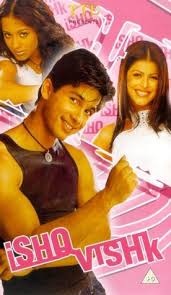 My Bollywood nostalgia knows no bounds, so I recently reached back into the vault for Shahid Kapoor’s debut film Ishq Vishk. When I started re-watching this 2003 Bollywood rom-com, all I really remembered about the movie was that it had some good songs and that this love triangle kahani launched the careers of its three lead actors.
My Bollywood nostalgia knows no bounds, so I recently reached back into the vault for Shahid Kapoor’s debut film Ishq Vishk. When I started re-watching this 2003 Bollywood rom-com, all I really remembered about the movie was that it had some good songs and that this love triangle kahani launched the careers of its three lead actors.
In a nutshell: Shahid Kapoor’s Rajiv longs to be one of the popular kids in his Archie Comics Riverdale High School-esque college. Rajiv is oblivious to the crush that the Betty to his Archie, Amrita Rao’s girl-next-door character, Payal, has had on him until he needs a date for an overnight retreat. Suddenly, Rajiv has eyes only for Payal, and a little “Aankhon Ne Tumhari” later and Payal can’t believe her dreams have come true. With problematic dialogue after problematic dialogue, writer and director Ken Ghosh essentially set the viewer up for the Alibaug retreat scene where Rajiv gets rejected by Payal, despite his assertion that his physical advances were justified because he’s her boyfriend.
Prior to this overt display of misogyny, Rajiv’s character had casually demonstrated plenty of subtle acts of male chauvinism. Most striking of which to me was his oft repeated phrase: “ladki ka ‘no’ matlab ‘yes”‘ (a girl’s no means yes). Disgusting. In a culture that already subjects women to unrelenting discrimination on just about every level, what kind of hideous memo do movies like this send to Indians at large? And Ishq Vishk is just one example of this frequently seen Bollywood message.
So imagine my pleasant surprise when I caught a glimpse of Homi Adajania’s “My Choice” video that is part of Vogue India’s #VogueEmpower campaign:
Immediately after watching this video, I couldn’t help but be a fan. The goal of this video was to empower women across India, and with Deepika Padukone’s voice boldly declaring — “my body, my mind, my choice” — there is at least an initial jolt of empowerment within this short clip.
However, not long after “My Choice” went viral, the video became subject to many valid criticisms. Some of the critiques touched on the hypocrisy of the message while others pointed out the elitist tones of the entire clip. All of these points have made me a bit more skeptical of the video, but I still applaud the creators and the 99 women featured in this piece for at least trying to generate some buzz on a topic that has needed more traction in India for generations. I truly believe that everybody involved with this project had good intentions, just not enough foresight into the overall impact of the video.
Unfortunately, the lack of nuances in #VogueEmpower’s “My Choice” video is just the tip of the iceberg for India’s perpetually growing “woman problem.” It has been over 2 years since the tragic rape and murder of Jyoti Singh Pandey. Over 24 months since the brutal attack that initially seemed to bring India out of its slumber. More than 730 days since Indians across the country vowed to improve conditions for women.
But what have we actually accomplished? The government “rushed” legislation and subsequently increased prison terms for rapists, while also criminalizing acid attacks, voyeurism, stalking, and female trafficking, but other than these legislative amendments little has changed in India.
There are still regular news reports about violence against women in India, and these are just the few stories that actually make it to the headlines, forget the countless other stories that go unheard. I am tired of defending India by saying that the first step towards sustainable changes is acknowledgement and awareness.
The “My Choice” video, directed by one of the industry’s most critically acclaimed directors and voiced by one of today’s most popular actresses, serves as a pleasantly stark contrast to Bollywood’s overly objectifying item numbers. However, it is still just another example of awareness with minimal impact, which seems to be the ongoing trend in a country that is devastatingly thirsty for change. Is the rapidity with which “My Choice” became viral going to ramp up acceleration of the social revolution India has needed for years? Most certainly not, and perhaps this is the greatest tragedy of all.
* * *
Farah Naz Khan is an internal medicine resident at Emory University. After graduating from college in Boston, she returned to her Alabama hometown to attend medical school, and was reunited with the mix of Southern hospitality and South Asian culture that had shaped her childhood. Follow her on Twitter @farah287 or read some of her thoughts at farah287.blogspot.com.












